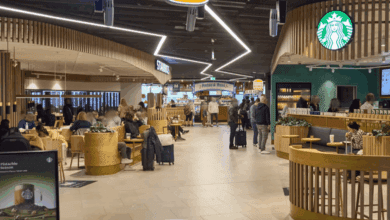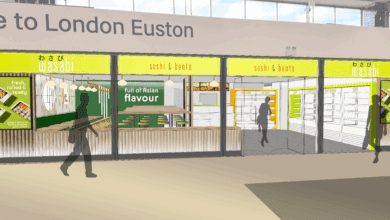Predictions vs reality: testing OakNorth’s outlook on hospitality
OakNorth points to the next stretch looking busy. With summer ahead, sunshine and sport create more chances to fill seats and sell pints

Register to get 1 free article
Reveal the article below by registering for our email newsletter.
Want unlimited access? View Plans
Already have an account? Sign in
The hospitality trade is a hard one. It runs hot in summer, cold in winter, and never moves in straight lines. Despite costs rising and customers shifting, the doors must open and the lights must stay on. As a lender to hotels, pubs and restaurants, OakNorth sees much of this activity and keeps a close watch on what’s ahead. Its Sector Pulse report, now in its third edition, tracks the changes behind the scenes: how money moves, where growth slows, and what pressures lie just beneath the surface.
The latest report revealed that operators are pressing forward, but carefully; summer may bring crowds, but costs are rising faster than footfall. AI is helping and so is flexible thinking, but no one expects the next six months to be a walk in the park. All that being said, how do OakNorth’s predictions measure up against real experiences?
Unsurprisingly, the situation remains challenging for the UK hospitality sector. In the six months since OakNorth’s last report, operators still continue to see their costs creep up, customers tighten their belts, and business owners continue to do what they can to hold the line.
Customers are either spending less, or looking to spend smarter. A steak dinner has given way to a grab-and-go box. Quick-service restaurants are up, while mid-market dining and bars, not so much. According to the ONS, 66% of adults say their cost of living has risen. That’s up from 45% just last summer.
Be that as it may, London’s hotel market has shown remarkable resilience – with the capital posting the second-highest occupancy levels among major global cities, according to OakNorth. Other top performers have been spa hotels, golf breaks and coastal wellness retreats.
The report also identified technology as a lifeline, rather than a competitive advantage. AI is being widely adopted by businesses to cut back on waste and smooth out rough edges. Some use it to schedule staff, others to check in guests or sell a better glass of wine. Zedwell Hotels, for example, uses AI-powered kiosks, and Miller & Carter employs AI for targeted marketing campaigns.
Six months in, survival has meant staying lean, thinking fast, and not waiting for the market to get kinder.
“With operating costs and wages climbing, more UK hoteliers are turning to automation to protect their margins and run leaner, more resilient operations,” says Florian Montag, VP of business development at Apaleo. “Even automating just 10% of tasks can make a noticeable difference to the bottom line.”
But some are going further. Montag adds, “When around 80% of operations are automated using one core infrastructure, the efficiency gains are significant. This means less manual work, fewer errors, lower costs, and more consistent service across properties in the portfolio.”
For suppliers like Apaleo, the rise of AI agents marks the next frontier. “To boost upsell revenue, an AI agent can autonomously identify guests celebrating special occasions and offer personalised add-on packages,” Montag says. “The agent’s performance, and compensation, can be directly linked to the actual increase in upsell revenue.”
Still, there’s trouble underneath. Insolvencies are down – 20% lower in February than the year before – but they’re not back to where they were before the pandemic. Debt, energy bills, and labour costs have left many walking a fine line. Six months in, survival has meant staying lean, thinking fast, and not waiting for the market to get kinder.
OakNorth points to the next stretch looking busy. With summer ahead, sunshine and sport create more chances to fill seats and sell pints. The lender’s report anticipates strong demand coming for quick eats and casual drinks because customers will likely be weighing up their F&B options based on affordability. So, beer gardens will pull crowds – so will anything light, simple, and easy to share. Big events – Wimbledon, the Lions tour, and England vs India – are expected to be among the big draws of the next six months.
“Everyone has had to revisit their plans,” says Deepesh Thakrar, senior director of debt finance at OakNorth.
City center foot traffic is increasing, particularly on Thursdays and Fridays, indicating that hybrid work patterns won’t be going anywhere. This incremental resurgence in the population’s office presence has shown to boost midweek business, particularly in cities like London, Birmingham and Manchester. According to OakNorth’s predictions, success will likely favour adaptable venues offering diverse menus – including non-alcoholic options.
In spite of all the great opportunities coming up for hospitality, OakNorth stresses they won’t carry the season on their own. Since the introduction of higher National Insurance contributions and the rise of the National Living wage in April, that will continue to put more pressure on an industry characterised by tight profit margins and a prevalence of lower-paying positions.
Operators will have to trim somewhere. “Everyone has had to revisit their plans,” says Deepesh Thakrar, senior director of debt finance at OakNorth. “There’s definitely been a tapering of growth aspirations and we’ll continue to see price increases alongside slower growth.”
In some cases, that means small changes that add up. “One hotel operator we work with has changed their housekeeping policy – rather than cleaning rooms daily, they now clean every other day for guests staying multiple nights,” Thakrar explains. “It’s a way to manage labour costs without cutting staff outright.”
For other operators, resilience is rooted in adaptability. Chief executive of Eviivo, Michele Fitzpatrick, sees strength among the independents. “Despite ongoing cost pressures across the UK hospitality sector, there is real resilience especially among independent and boutique operators,” she says. “The OakNorth report highlights shifts we’ve been observing over some time – streamlining operations, localisation and experience-led offerings.”
A pragmatic optimism prevails, driven by a shift towards sustainability, precision and value rather than just rapid expansion.
Technology, once again, plays a growing role there too. “The goal is no longer to scale teams, but to empower smaller teams with better tools that optimise the majority of operations,” Fitzpatrick notes. “AI-powered solutions are playing a larger role in this shift, from automating guest communications and streamlining bookings to generating performance insights in real time.”
But tech alone won’t be enough, and to an industry like hospitality the guests still matter a great deal. “Guests remain price-sensitive but are still spending – particularly where authenticity and service quality are guaranteed,” Fitzpatrick concedes. “This is why we’re seeing an uptick in experience-based offerings and properties leaning more into design and locality.”
Beyond that, the pound bears watching. If it falls against the dollar, more Americans may come. If it rises, fewer might. But as Thakrar admits, “From what we see in the UK, though, the country continues to be a strong tourist destination. There’s a lot to see and do, and that fundamental appeal isn’t going away.”
While the hospitality sector faces challenges with slower growth and tighter margins, adaptable businesses focused on guest experience and efficient, intentional growth will find success. A pragmatic optimism prevails, driven by a shift towards sustainability, precision and value rather than just rapid expansion. Adaptation is also proving crucial for survival, with those balancing cost, creativity, technology and guest satisfaction likely to thrive in the coming six months.







